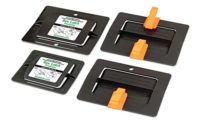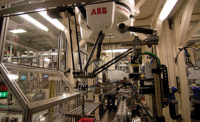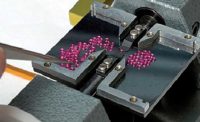Magnetic materials may not be well-known by the general public, but many of the world’s leading manufacturers would be in trouble without them. These materials include iron, nickel, cobalt, alloys of rare earth metals, and some naturally occurring minerals such as lodestone.
SG Technologies (SGT) has been developing innovative magnetic materials and making parts from them for many decades. These parts enable SGT’s well-known customers (Bosch, Delphi, Ford, Volkswagen, Caterpillar) to cost-effectively improve the efficiency and performance of their end products.
A little more than a year ago, increased demand for SGT’s magnetic parts used in automotive fuel injectors forced managers to consider automating the packaging of these parts. Step one for the managers involved hiring automation consultant GB Innomech Ltd. (GBI) to perform an in-depth feasibility study to determine the cost-effectiveness of replacing the current labor-intensive packaging method with a high-speed automated system.
Happy with the study’s results, SGT gave GBI engineers the green light to build a prototype that demonstrates key aspects of the system. The engineers were then asked to build, test and integrate the full system into SGT’s existing production line. This work lasted 10 months and was completed earlier this year. Since then, the system has been operating 24/7.
“This system provides us with increased flexibility and capacity to meet fast-growing and changing customer demands,” says Stuart Hutcheon, commercial director at SGT. “It also removes any risk of potential damage to products through manual [part] handling. This is critical in our drive towards zero-defect manufacturing.”
The system handles two distinct product families, each of which contains multiple variants and requires no manual adjustment. After an operator inserts a tray of more than 100 parts into the system, they are indexed on a rotary turntable, and the height of each part is verified with a high-speed laser micrometer.
Parts within height tolerance (a few microns) are dispensed onto a toothed conveyor belt and moved into large work-in-progress trays. Shortly thereafter, a Codian delta robot equipped with specially designed end-of-arm tooling lifts five parts at a time and moves them into packaging trays that are ready for shipment.
According to Hutcheon, the system has increased production line throughput by up to 150 percent, while improving manufacturing efficiency and reducing work in progress. It also frees up skilled operators to work on more challenging manufacturing tasks, such as short production runs of highly specialized parts.
SGT makes both soft and permanent magnetic materials. Soft materials include silicon, chromium and phosphorous irons for solenoids, as well as an insulated-iron-based composite powder (fine or large grain) for high-speed solenoids and electric motors. The company’s permanent materials are bonded neodymium iron boron (for injection-molded parts), and sintered aluminum, nickel and cobalt (for sensors).
GBI works with major manufacturers in various industry sectors, including medical devices and pharmaceuticals. Founded in 1990, the company is based at The Innovation Centre in Witchford, UK. It received The Queen’s Award for Enterprise in 2009 in recognition of its sustained growth in international markets.
For more information on automating
assembly processes, call 44-1353-667394 or visit www.innomech.co.uk.





